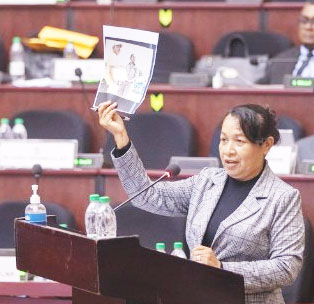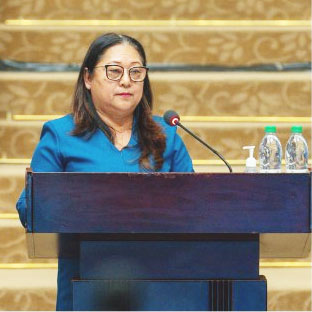Shadow Minister of Indigenous People’s Affairs Dawn Hastings-Williams has called on the government to stop the “lip service” and truly pay more attention to addressing the woes of citizens in hinterland communities.
During her budget debate presentation on Wednesday last, Hastings-Williams lamented that to date many residents of Cuyuni-Mazaruni (Region Seven) deplore the poor internet services offered by the information and communications technology hub in several communities. Resultantly, access to online education is challenging, she told the National Assembly.

Hastings-Williams, who hails from Region Seven, said: “Mr Speaker, I have spoken to teachers, nurses and other workers in the hinterland who have applied to do online courses but have not been able to do so successfully due to the lack of connectivity and the few who managed to commence are making sacrifices to buying megabytes from private satellite internet services in the communities, and many have lamented that they may not be able to continue, or even dream of completion due to the high cost.” She noted that some people are unable to travel to Georgetown to pursue tertiary education as it is very exorbitant.
The People’s National Congress Reform General Secretary said that some relief was given to teachers following her intervention. “I can also recall approaching the Minister of Education, whom I have great respect for, Priya Manickchand about the teachers who were enrolled to do online courses but were unable to do so in my region and specifically in Upper Mazaruni. I am very appreciative that she came up with something and that is to bring them out to Georgetown to attend classes at CPCE [Cyril Potter College of Education],” she said.
She also noted that several teachers were able to complete their bachelor’s and master’s degrees in education at the University of Guyana.
Turning her attention to the issue of insufficient primary schools and improper housing and water facilities for residents in Region Seven, she said while the APNU+AFC government had built six primary schools there in three years, the current PPP government has not built any more.
“Under the coalition, we built a new Kamarang Primary School, a new Paruima Primary School and that is the home village of my colleague MP Lee Williams over there. A new primary school in Kako, my home village, a new Imbaimadai Primary School and began construction of a new primary school at Eteringbang just to name a few,” she expanded.
“We did that without the oil money, Mr Speaker. Let me tell you how many new schools have been built under this administration for the past three years. Mr Speaker, this government dismantled the existing primary school at Waramadong putting the pupils and teachers out of classrooms and occupying various buildings, which of course poses challenges in terms of supervision and teaching effectively.”
Hastings-Williams told the house that the Desrey Caesar Fox Secondary continued to be plagued with several challenges varying from poor lighting, inadequate water supply and a substandard dining hall for children.
“Mr Speaker… Would you believe our indigenous children and teachers who are housed there have to be fetching water in buckets from the creek or river to bathe and wash in this 21st century?” she asked rhetorically. “Can you believe that there is no proper dining hall for students to sit and enjoy a meal since the small dining hall has to be used to accommodate classrooms?”
She said that students, teachers and the parents of the aggrieved children are looking forward to the touted $1.146 trillion budget to address the anomalies which exist at the school.
The APNU+AFC member also said that the water supply systems in the communities such as Kamarang and Jawalla are “inadequate”.
According to her, many citizens of the region confirmed that they don’t receive water regularly.
“I call on this government to treat Region Seven then as a special case. Do a special study and let this budget find ways and means of catering for Region Seven. They are Guyanese too and they are in the Essequibo.”
Land titling
In response, Minister of Amerindian Affairs Pauline Sukhai upbraided the APNU+AFC for neglecting the Amerindian Land Titling (ALT) project, as well as their welfare, during its time in office.
The minister recapped that this critical project which was expected to guarantee legal protection of Amerindian lands was stagnant during the opposition’s tenure and immediately after assuming government, the PPP/C resuscitated the programme.
According to Sukhai, within two years under her government, 20 investigations were conducted and in less than two years, seven extensions were awarded, while eight demarcations were conducted and land titling will be further advanced by the Ministry of Amerindian Affairs in 2024 with an allocation of $800 million.
“The APNU+AFC had no intention to advance land titling for Amerindians… It was under the PPP/C government that the percentage of land owned privately by Amerindians increased from six percent to 16 percent. The ALT project will go down in the history of this house and the records. It will show that the majority of lands titled to Indigenous people were all done under the PPP/C government,” she said.
Sukhai further charged that millions of dollars from the Amerindian Development Fund (ADF) were unaccounted for during the opposition’s five-year tenure.
According to the minister, more resources are being made available for education, health, and other integral social sectors by the government across Amerindian communities. She said that the Budget 2024 includes an allocation of $9 billion, which includes $2.7 billion in carbon credit funds to support village-led projects in over 200 Amerindian communities.
Initiatives include $100 million to support the hosting of the National Toshaos Council, $3.4 billion for presidential grants, $147 million to promote Amerindian culture, and $100 million to support hinterland students under the Hinterland Scholarship Programme.
She emphasized that the budget is designed to sustain the country’s development and provide support to vulnerable groups including women, youth, and persons living with disabilities, as well as public servants and farmers.
“Guyanese families do not have to fear the removal of cash grants from their children any longer. The pensioners do not have to fear being unable to pay their water or electricity bills any longer. That is assured under the PPP/C government. The APNU+AFC thought those support measures to vulnerable groups were excessive, and so they removed them,” she said.
However, this was rejected by Hastings-Williams who said that there are still a few persons in hinterland communities who cannot afford to pay their utility bills.
She said that the government’s talk of promoting a sustainable life for all was not even-handed but rather selective, which Sukhai deemed fallacious.
But this didn’t prevent Hastings-Williams from concluding that the 2024 budget means nothing to the man in the street.
“The $1.146 trillion budget will mean nothing to the majority of the Guyanese population, the working class, the poor and the vulnerable, the old aged pensioner, who are struggling to meet ends in this oil-rich country. Especially when there is no desire to find a common ground for a good cause that will have an impact on the lives of our citizens,” she argued.










